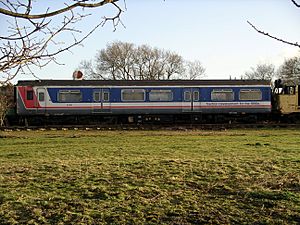British Rail Classes 316 and 457 facts for kids
Quick facts for kids British Rail Classes 316 and 457 |
|
|---|---|

This special train, unit 67300, is now at the Electric Railway Museum, Warwickshire.
|
|
| In service | 1989 (as Class 457) 1990 (as Class 316) |
| Number built | 1 |
| Formation | 4 cars |
| Operator(s) | British Rail |
| Specifications | |
| Traction system | 750 V DC (Class 457) 25 kV AC (Class 316) |
| Track gauge | Standard |
The Class 316 and Class 457 were two different names given to the same special train. This train was an electric multiple unit (EMU) used as a test model, or prototype, for a new group of trains called the Networker series. It was given these names at different times while it was being tested.
Contents
What Was This Special Train?
This train was built to test new ideas for future trains. It was a single, four-car train that British Rail used to try out new technology. The goal was to create a new series of modern trains for passengers. These new trains would be known as the Networker family.
Why Two Class Names?
The train was first known as Class 457 when it was built in 1989. At this time, it was designed to run on 750 V DC electricity. This is a common type of power for trains in some areas.
Later, in 1990, the train was changed to run on a different type of electricity: 25 kV AC. Because it could now use a different power system, it was given a new name: Class 316. This showed that it was a different kind of electric train.
What is TOPS?
TOPS stands for "Total Operations Processing System." It's a computer system used by British Rail to keep track of all its trains and wagons. Every type of train is given a special "class" number. This helps railway staff know exactly what kind of train they are dealing with. So, Class 316 and Class 457 were just the numbers given to this test train.
What is an EMU?
An EMU is an "Electric Multiple Unit." This means it's a train that runs on electricity. The "multiple unit" part means that the train has its own engines (motors) in many of its cars. This is different from a train that needs a separate locomotive (engine car) to pull it. EMUs are often used for passenger services, especially on busy commuter lines.
The Networker Family
The special test train helped British Rail design the Networker series. These were modern, comfortable trains built for commuter lines in the south-east of England. They became very important for daily travel. The tests done with the Class 316/457 helped make sure the Networker trains would work well.
Where is it Now?
After its testing days were over, this unique train was saved. You can now see the vehicle 67300, which was part of this prototype train, at the Electric Railway Museum, Warwickshire. It's a piece of railway history.
 | Bayard Rustin |
 | Jeannette Carter |
 | Jeremiah A. Brown |

